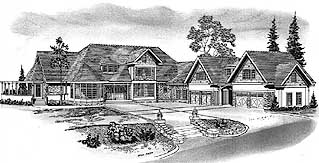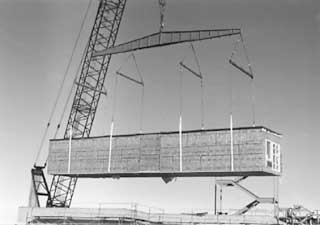|
Subscribe / Renew |
|
|
Contact Us |
|
| ► Subscribe to our Free Weekly Newsletter | |
| home | Welcome, sign in or click here to subscribe. | login |
Construction
| |

September 28, 2000
Modular construction goes to new heights
Special to the Journal
Modular construction isn’t new to the Pacific Northwest but Construction Resource Group (CRG) of Redmond is lifting crane-built technology to new heights with such projects as the $50 million Quinault Beach Resort at Ocean Shores, a Victorian home in Lake Stevens and a $1.5 million "spec" home in Bellevue.

|
New Englander Timi Starkweather, a principal in CRG and its managing partner, left an interior design firm in Washington, D.C., to come to the Seattle area several years ago. Impressed by the expansive modular construction industry in the Eastern states, she formed CRG to spotlight the important role modular technology can play in the Northwest’s often weather-restrictive construction environment.
"That’s why we built a 3,300-square-foot modular Victorian home in Lake Stevens -- the Rosewood Design Center -- to show visiting contractors and developers the quality and cost-savings of modular construction," Starkweather said. "With short building seasons, short lists of qualified subcontractors and increasing demands for quality products, systems built construction makes sense. You get strict cost control, a significant reduction in subcontractor management issues, factory completion times that are half of site-built timelines and consistent craftsman quality at guaranteed prices."
Contractors, designers, developers and subcontractors have been visiting the Lake Stevens Victorian home since it was finished last July, costing about $85 per square foot, including the land, compared to $130 a square foot for a similar site-built home, according to the company’s marketing and sales principal Scott Pearl, a former Windermere agent.
Most of the cost savings were derived from the efficiencies of building the home in a controlled environment unhampered by weather delays, using skilled carpenters and craftsmen who finish each module with carpeting, cabinets, wiring and plumbing before it leaves the factory. Homes the size of the Victorian -- built with seven modules -- can be finished in about 14 working days and assembled on a prepared site in a few weeks. Prices quoted before the factory begins production are guaranteed. And there are savings in finance carrying costs because of the shorter project construction time compared to site-built projects, Pearl said.

|
Also, modular buildings bolted and welded together in sections have more structural integrity, better sound proofing and more insulation, Pearl said, because the linked structures have double walls, floors and ceilings.
"Many people, not only developers and buyers but the construction industry as well, don’t know much about the modular industry in the Northwest. We needed a place like Rosewood to show the building industry what could be done with these techniques and the level of quality we can achieve," he said.
After deciding to attract attention to modular construction in the Northwest, CRG surveyed several modular builders in the region, settling on Britco Structures of Surrey, B.C., chosen for the quality of their work, Starkweather said. While site preparation is underway, Britco’s crews are scheduling the factory construction work. Choices of carpeting, appliances and other customizing aspects of the construction are made through CRG rather than multiple sources.
In fact, the company provides a variety of one-stop services, from project management and engineering to custom architectural design by a team that knows modular building techniques, plus site construction, transportation of the modules, crane crews to set the units, interior design, financing alternatives, staff support throughout the process and real estate marketing, sales and brokerage support.
The Redmond firm’s modular projects include retail, light-industrial and office park structures, hotels, assisted-living facilities, schools and conference centers, plus residential projects ranging from affordable single-family homes to high-end custom models, condominiums, townhomes and apartment communities.
In addition to a modular Lynnwood apartment building now in the permitting stage, CRG is preparing to build a $1.5 million "spec" residence in Bellevue’s Bridle Trails neighborhood, a home designed by CRG’s design services partner, Bill Garnett. "We think there’s a good market there for homes of this size and quality," Pearl said. "We have a second one in the same price range ready to go."
The company’s largest modular gem on display in the Northwest is the new 159-room hotel at the Quinault Beach Resort, finished last spring at Ocean Shores. Built by general contractor BFC Frontier, the top three floors of the hotel were craned into place by CRG and Britco during winter storms that brought 60- to 80-mile-per-hour winds, frequently shutting down construction.
"Being able to have the units built in factory conditions before they reached the site made the difference in meeting the Quinaults’ deadlines," said Joe Mitter, CRG’s principal in charge of project management. "For whatever reason, the Northwest is 15 years behind the rest of the country in using modular construction. Now, modular technology is becoming more accepted here, in part because there’s a tight market in the sub-trade community that’s causing builders and developers to look at alternative ways to get their product built. With modular construction, there are skilled workers on the payroll working all year around."
Terry Stephens is a freelance writer based in Arlington. He can be reached by email at features@gte.net.
Terry Stephens is a freelance writer based in Arlington. He can be reached by e-mail at features@gte.net.
Previous columns:
- Affordable housing to be studied at conference, 09-21-2000
- County trying to curb construction waste, 09-14-2000
- Nuprecon expanding its services and markets, 09-07-2000
- KJM rides transit boom, 08-24-2000
- Seattle Iron & Metal streamlines its operations, 08-17-2000
- More than meets the eye at 505 Union Station, 08-10-2000
- A frothy solution to fend off earthquakes, 08-03-2000
- Paint additive really beats the heat, 07-27-2000


